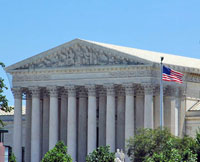Unknowns loom as marriage arguments draw near at Supreme Court
 One month away from the most historic and, perhaps, influential U.S. Supreme Court cases in LGBT history, a surprising number of facts are still unknown.
One month away from the most historic and, perhaps, influential U.S. Supreme Court cases in LGBT history, a surprising number of facts are still unknown.
For instance, while New York attorney Roberta Kaplan will argue the merits of lesbian plaintiff Edith Windsor’s position that the Defense of Marriage Act (DOMA) is unconstitutional and lesbian law professor Pamela Karlan will argue Windsor’s position on the legal standing issues, it has not yet been decided exactly who will argue the merits and the legal standing issue for the couples opposing Proposition 8. Ted Olson, who along with David Boies is leading the legal team challenging Proposition 8, says his team will decide who will argue the merits and who will argue the standing issue after seeing what the Solicitor General decides to file—or not file—in their case.
There have been no signals from the Supreme Court that it will make the audio recordings of the two cases available to the public on the same day as the arguments, as it did with the landmark health reform cases. (Normally, such audio is not available until the end of the week, though a written transcript is often available on the same day as the argument.)
It has still not been announced by the Solicitor General’s office what argument—narrow or broad—the Obama administration will take in opposing DOMA. And there has been no indication of whether the Obama administration will even take a position in the Proposition 8 case.
But a lot of these unknowns are about to be resolved. Critical briefs –particularly from the Solicitor General’s office—are due to be submitted to the Supreme Court this week.
Friday, February 22, is the Solicitor General’s deadline for laying out the Obama administration’s view of how the court should resolve the DOMA dispute. And February 28 is its deadline to file a brief in the Proposition 8 case, if it chooses to do so.
This much is known: The Obama administration considers DOMA unconstitutional and President Obama has publicly made very clear that he believes same-sex couples should have the right to marry.
The question, according to two articles this month in The New Yorker magazine, is whether the Obama administration will take positions that promote a “bold” striking down of all anti-gay marriage laws, beyond DOMA, or a more “cautious” dismantling of them, state by state.
In the Proposition 8 case, notes legal analyst Jeff Toobin, “Obama could take the position, as the plaintiffs have, that the Constitution compels every state in the union to allow same-sex marriage.”
“If adopted,” he said, “this argument would turn the Hollingsworth case into the gay-rights equivalent of Loving v. Virginia, the 1967 landmark decision that said states could no longer ban interracial marriage.”
In the DOMA case, notes gay Democratic activist and attorney Richard Socarides, where the government is already on record, the bigger issue is “whether the federal government should just abide by state laws legalizing same-sex marriage, by overturning the Defense of Marriage Act, or, more powerfully, by saying that every American has that right.”
To reach that latter—bold—result, the Supreme Court would have to agree with the Second Circuit U.S. Court of Appeals decision in U.S. v. Windsor that courts should given a heightened level of scrutiny to laws treating people differently because of sexual orientation.
“If the Supreme Court adopted that reasoning to strike down DOMA (in Windsor) and Proposition 8 (in Perry),” wrote gay legal scholar William Eskridge, in a December 9 post at scotusblog.com, “every state marriage law excluding lesbian and gay couples would be in immediate jeopardy, because no state could muster a compelling or substantial public interest that would satisfy the Second Circuit’s approach.”
That’s how big the decisions in Windsor and Perry could get.
“Windsor and Perry are likely to be two of the most important constitutional decisions in our lifetimes,” wrote law professors Neal Devins and Tara Leigh Groves at scotusblog December 8. “If (as we suspect), the Court reaches the merits of each case, we believe it will advance the cause of same-sex marriage by invalidating both DOMA and Proposition 8. But, in our view, the Court’s jurisdictional rulings—on the power of a single chamber of Congress and private sponsors of ballot initiatives to defend federal and state measures—will also have important implications, informing the scope of the constitutional separation of powers at both the federal and state level.”
But “if the court reaches the merits of each case” is one of the looming uncertainties in both cases. The court may not rule on the merits of each case. It could make a ruling on standing that would preclude it reaching the merits of the disputes.
“If the Court does not rule on the marriage rights issue itself in either of the granted cases, and that is all that is concludes on the issue this Term,” wrote veteran Supreme Court reporter Lyle Denniston, in his December 7 post at scotusblog, “the question would arise whether it might take on some of the other pending cases, so as to reach the more fundamental constitutional dispute. That, however, might come too late for a decision this Term, with a likely recess in late June.”
Briefs from parties on both sides of both cases are due to the court on the issue of legal standing, as well as the Olson-Boies’ brief about the merits of the Proposition 8 argument, are due this week.


If there is no standing in the DOMA case, then the lower ruling stands? What would that mean at a federal benefits level?